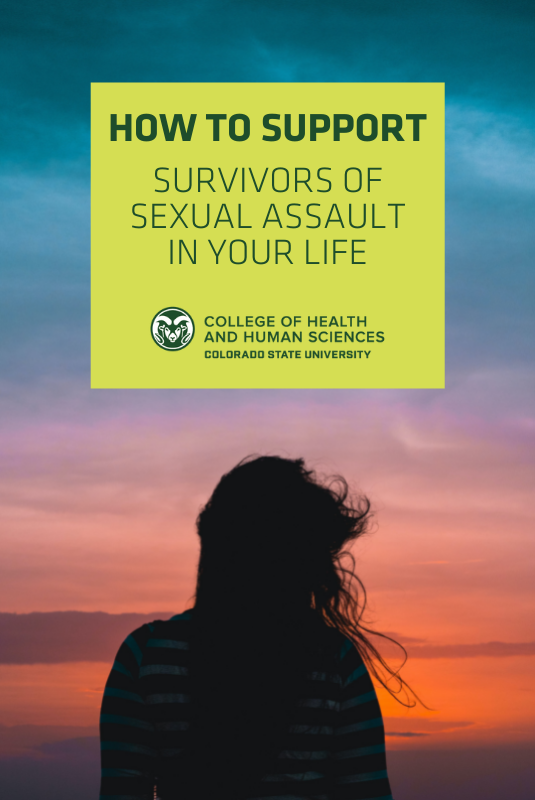By Margot Allen, CSU Marriage and Family Therapist Intern
When someone you care about tells you something traumatic that has happened to them, it can be hard to know how to react in a supportive way. If you have been unsure about what to say in those moments, you are not alone. Because of this, we are the Center for Family and Couple Therapy in the Colorado State University Department of Human Development and Family Studies is offering helpful strategies you can use to support a survivor or victim of sexual assault in your life.
The first step to supporting a victim or survivor of sexual assault is to believe them.

Much like how different people like to receive love in different ways, as expressed in love languages, different people may feel supported by different things.
Here are some ways you can support:
1) Providing space for the person to talk about their experience at their level of comfort. Providing space is all about listening and taking in what the other person is saying. It is not about fixing the situation or offering advice. It can be very hard to not offer solutions because you may really want to help, but immediate action is not always the best solution.
2) Validating the feelings and thoughts that accompany the traumatic experience. Interpersonal violence often does not make sense. Only 7% of sexual assaults are committed by strangers, indicating that perpetrators are most likely someone the individual knows. People often do not expect those close to them to hurt them, so it can be confusing and heartbreaking when someone they trust does this to them. Validating their thoughts and feelings can help them navigate this confusion. You can validate by expressing empathy and asking questions to show you are listening. For example, you can say “It is so awful what you went through, how can I best support you?”
3) Recognize that healing from trauma does not exist on a predictable timeline. Everyone’s healing process has a unique path and timeline. Try to provide leniency for your loved one to heal on the path and pace that they choose.
4) Allow them to have choices. Sexual assault is something that takes choices away from a person, so it can be helpful to have their choices restored to them. Choices can range from deciding how much information to disclose, to whom, at what time, to deciding what kind of pizza they want.
5) Offering resources that may be helpful. Victims or survivors of sexual assault are most likely to first confide in a friend. If someone discloses their experience of sexual assault to you, you may be told before they seek out resources. Knowing the resources available in your area, is another way you can provide choices for someone who has been sexually assaulted. However, remember it is their choice what resources they will use and when they will use them. You may say something like: “Thank you for trusting me and telling me that. I believe you and want to help support you. Do you want to know of some of the resources available to you?”
- CSU Resources
- Community Resources
6) Care for yourself. Sexual assault is a difficult thing to hear about and process. Some people may think: “Well, I wasn’t sexually assaulted, so I’m fine.” This may be true for some people, but it is not always the case. Some may experience secondary traumatic stress or vicarious trauma, which can have effects like post-traumatic stress. It is important to know there are resources for secondary survivors of sexual assault. Secondary survivors are people who are supporting individuals who have been sexually assaulted.
If you would like additional support navigating the realities of this time, the CSU Center for Family and Couple Therapy has registered counselors available to meet with you now. The CFCT is currently providing all Colorado residents low-cost individual, couple, and family online video sessions during daytime and evening hours to fit your schedule. To schedule an appointment, please call (970) 491-5991 or email cfct@colostate.edu.